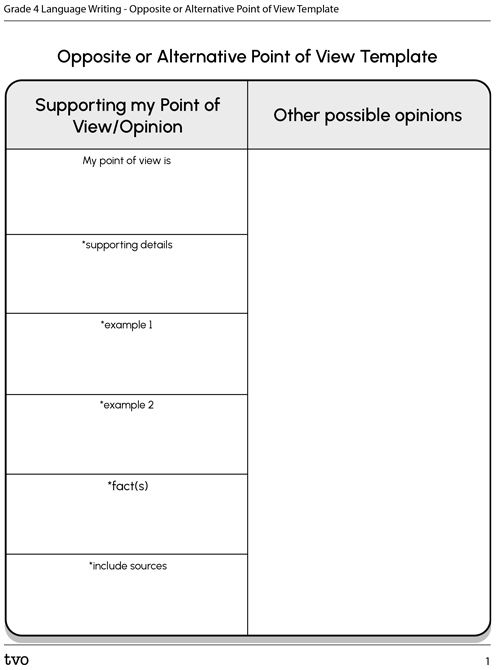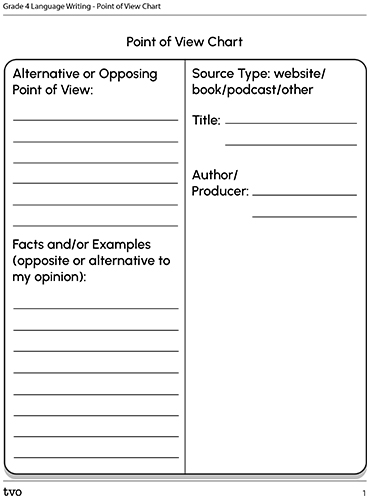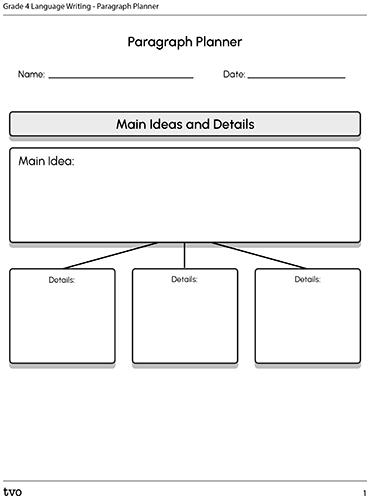Minds On
Opinions and facts
Student Success
Think-Pair-Share
Explore some synonyms for the word "opinion" using a thesaurus. Record the synonyms in your journal, paper, or electronically (speech-to-text or audio-record).
Where does this word originate from? Think and record some words that have similar parts or groups of letter blends.

Next, find some synonyms for the word "fact" (use a thesaurus). Where does this word originate from? Think and record some words that have similar parts or groups of letter blends. Discuss the difference between an opinion and a fact with a partner, if possible.


Note to teachers: See your teacher guide for collaboration tools, ideas and suggestions.
In this learning activity, you will need to support your own opinion with some important and relevant facts and/or examples and reasons to explain why you have or how you formed your opinion(s).
Action
I support my opinion with facts
You may find that opinions of others are not always based on FACTS. They can be based on what each person LIKES, WANTS, FEELS or thinks is good or bad. You will have to listen and think critically (carefully) to judge for yourself when someone shares their opinion, whether or not their opinion is supported by enough relevant facts, examples and reasoning.
An OPINION is what someone AGREES or DISAGREES with, or THINKS is GOOD or BAD. Opinions can be agreed with or disagreed with. Opinions can change. Opinions can be argued.
FACTS are things that are known to be TRUE or proven (proof or evidence) to be TRUE. Dates, events, things we notice, such as the number of items you notice. We can be aware of or touch the number of items put before us. This is our proof. People may try to convince you or confuse you otherwise, but please don’t let them.
Facts cannot be argued. Facts simply are. Facts are things that happened and are true. We often work with facts like observations, measurements, and proofs in subjects like math, science, news reporting, sports, history, geography, the arts.

Math statements and equations are facts. Three hundred plus three hundred three equals 603. It is also true that the sides of a square are always equal. That is the definition of a square, not that of a circle. A triangle has 3 sides. This is always true by definition of a triangle.
There are scientific proofs, theorems and laws of the Universe. These are scientific facts that have been observed, recorded, researched, proven, confirmed and accepted in the field of science.
YOU are a child, not an adult. You are officially considered an adult when you turn 18 years old. These are facts.
What’s my opinion? What are other possible opinions?
Pick a side exercise
Consider some of the following statements. Decide whether you agree or disagree. If you’re not sure or feel you don’t have an opinion, pick the side that you think you might lean towards more just for this exercise.
| # | Statements | Do you... |
|---|---|---|
| 1 | The government should spend people’s money (taxes) for space research. | Agree or Disagree |
| 2 | Computers are just as good as and can replace teachers. | Agree or Disagree |
| 3 | Zoo animals live happy lives. | Agree or Disagree |
| 4 | Even though there is world hunger (food shortages/starving people), countries should still spend money on the Olympics. | Agree or Disagree |
| 5 | The number of students in a classroom doesn’t affect their learning. | Agree or Disagree |
| 6 | Students at school should be able to have a say in who they have for their teacher. | Agree or Disagree |
| 7 | People convicted of animal abuse should get the same punishment as if they abused a person. | Agree or Disagree |
| 8 | People don’t have the right to kill animals. | Agree or Disagree |
| 9 | Homework should be banned. | Agree or Disagree |
| 10 | Students should make the rules that they have to follow at school. | Agree or Disagree |
| 11 | It’s OK to send our trash into space. | Agree or Disagree |
| 12 | Schools should ban kids using the term “best friend.” | Agree or Disagree |
Whether you agree or disagree, that is your point of view or opinion.
Using one of the previous statements, record your OWN statement that expresses your point of view. Do this for at least 3 statements above. OR you may have a very strong opinion about another topic that is not listed above that you wish to use an Agree or Disagree Statement with.
You can use the following chart as a reference to write your point of view. Research some facts, details and/or examples to support your point of view (opinion). This means include facts and examples that might convince someone to have the same point of view as you. Use jot notes and underline key information. Also, write down at least 2 other possible opinions (including the opposite point of view) and another. For other possible points of view (that aren’t the opposite), try to think of what people might think and respond to your point of view.
Complete the Opposite or Alternative Point of View Template in your notebook or using the following fillable and printable document.

Press the Activity button to access Opposite or Alternative Point of View Template.
Activity (Open PDF in a new tab)Write a paragraph
Pick one of your points of view to write a paragraph. Use a paragraph form.
Complete the Paragraph Planner in your notebook or using the following fillable and printable document.
Write your first draft. If possible, peer conference or self-check to determine if you have enough facts, and/or examples to support your own point of view. Based on your feedback, you may find you need to gather more facts or confirm that your information is factual by confirming it from more than one source (2-3 different credible sources).
Challenge!
Research the opposing or an alternative point of view. Find three facts or examples that support the point of view opposite or alternative to yours.
Complete the Opposite or Alternative Point of View Template in your notebook or using the following fillable and printable document.

Press the Activity button to access Opposite or Alternative Point of View Template.
Activity (Open PDF in a new tab)Consolidation
Judge for yourself
How do you determine that you have developed an informed opinion? Select an article to examine. As you explore, keep track of the opinions and/or facts that you notice. If opinions are provided, are they supported by facts? What did you notice? Did you notice more facts than opinions?

Reflection
As you read through these descriptions, which sentence best describes how you are feeling about your understanding of this learning activity? Press the button that is beside this sentence.
I feel…
Now, record your ideas using a voice recorder, speech-to-text, or writing tool.




